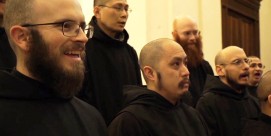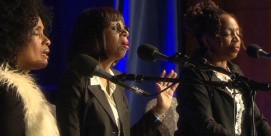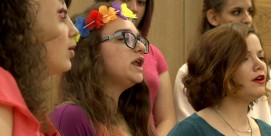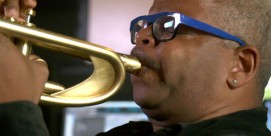Tord Gustavsen Interview
Tord Gustavsen and the Church of Jazz
Sorry you need the latest version of the free flash plug in. CLICK HERE to download it and then refresh this page.
The Tord Gustavsen Trio just completed an American tour to mark the release of a new CD called THE GROUND (ECM). “Gustavsen draws on his classical and church backgrounds to compose elegant, hymnlike melodies,” says THE WASHINGTON POST. Read an e-interview with Norwegian pianist Tord Gustavsen and listen to a track from the CD.
Almost everyone remarks on the prayerful, hymn-like quality of your music, and you call some of the pieces “wordless” hymns. What is the connection between hymns and prayer and jazz for you, and where did it come from?
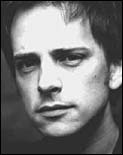
To me, there’s a strong connection on a personal level. I feel it’s important to dig into what’s lying deep in one’s musical self in order to play “organic” jazz, and that may involve getting in touch with music sung, played and/or listened to during childhood. Growing up, I had a lot of hymns and spirituals along with lullabies and children’s songs in my home, and so this music is crucial in making up my musical foundation. It’s best to reach out and explore from a nurturing and caressing foundation.
Also, there is of course a strong link between spirituals and jazz in music history; both European hymns and African American spirituals were among the important musical traditions present in the melting pot area where “jazz” was formed. Contemporary jazz that moves too far away from the devotional feel — with or without an explicitly spiritual emphasis — has a tendency to lose its appeal to me. I do love a lot of complex, hard core, intriguing music… but there is something about uplifting and profound grooves and about essential, simplistic sensualism in creative improvisation and melodying … these things are spiritual to me, and they are core elements of the music I cherish the most.
Across the U.S. — from the famous St. Peter’s Lutheran Church in Manhattan to the Church of St. John Coltrane in San Francisco — there are more and more churches where you can find jazz. What’s been your own experience of churches and their music (playing with choirs, your connection with Oslo’s Church City Mission) and where do you see and hear their influence on you? Where do gospel and the African American spiritual fit into what you do?
Jazz and “world music” have been present in churches in Norway for a couple of decades — not necessarily on a regular basis, but in occasional projects and special masses, etc. Also, a few of my colleagues have composed original “jazz masses” using Latin words from the old liturgies and Norwegian translations integrated in jazz’s musical language. Important as this has been, I often feel that one is looking too much for single-dimensional “happy” music when looking for jazz in churches. I have been involved in doing a meditative jazz vesper in an Oslo church during the last two years, responding to the need we’ve felt for a service with room for silence and reflection, using music with more space and incorporating musical landscapes that embrace melancholy and uplifted states without trying to impose a specific mood on people.
Regarding gospels and African American spirituals, cf. also the remarks above. I’ve played a lot of this music during the years, and spirituals are probably among the core sources of my own music today. I also did a special project a few years ago based on a collection of lesser-known but extremely inspiring spirituals I found at the Schomburg Center for Research in Black Culture in Harlem. I’m not, however, too intrigued by the way these traditions are mostly performed today. They are often connected to an easy-going theology of success and salvation that I don’t really support.
Your bio says you’ve composed music for the words of poet John Donne and you’ve even studied the history of religions. What draws you to the religious and the spiritual and to things theological?
The John Donne thing was a very important project to me. It was the first CD I ever recorded, with singer Siri Gjære in a vocal-piano duo with no other instruments added, thus very focused on the lyrics. The almost erotic-mystic aspects of his writing appealed to us, as did the extravagant flow of words; we thought they formed an intriguing combination with the naked simplistic-yet-subtly-twisted music we were making.
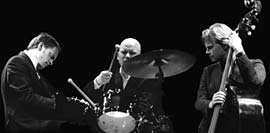
I’m probably drawn to spiritual and theological issues mainly because I’ve been fascinated by the questions raised here ever since Sunday school. My outlook and perspectives have evolved from the traditional Lutheran views of my childhood toward an open-minded “secularized” spirituality still founded in the Christian sacraments but appreciating insights from several religions; staying in the liturgical serenity but taking in postmodern paradoxes; and being fed by the liberal theological wing of our church — this is basically my journey. The issues of theology are still important to me even though the perspectives are different.
It’s been said that jazz is music with deep religious roots and that it’s the best music for worship because of the way it speaks to the human condition. Does that ring true for you and your own experiences of music?
Well, I guess from what’s been said so far this should be quite obvious …
One critic has called your melodies “an abstracted alleluia.” When you write about the Colours of Mercy or Kneeling Down or other themes that seem to suggest something spiritual, even sacred, what do you want a listener to hear?
I should read this critic … it’s a really nice expression. But I don’t think I want the listener to experience anything specific — at least not something that can be equally well expressed in words in an interview. To me, the title “Kneeling Down” is almost too direct, but it still works because it really corresponds to the feeling I had of the melody myself. “Colours of Mercy” is a favorite title of mine, along with “The Ground,” at once mild and comforting and bold, and certainly always open to different readings — like I want the music to be, and like a religion we could truly relate to today would have to be.


